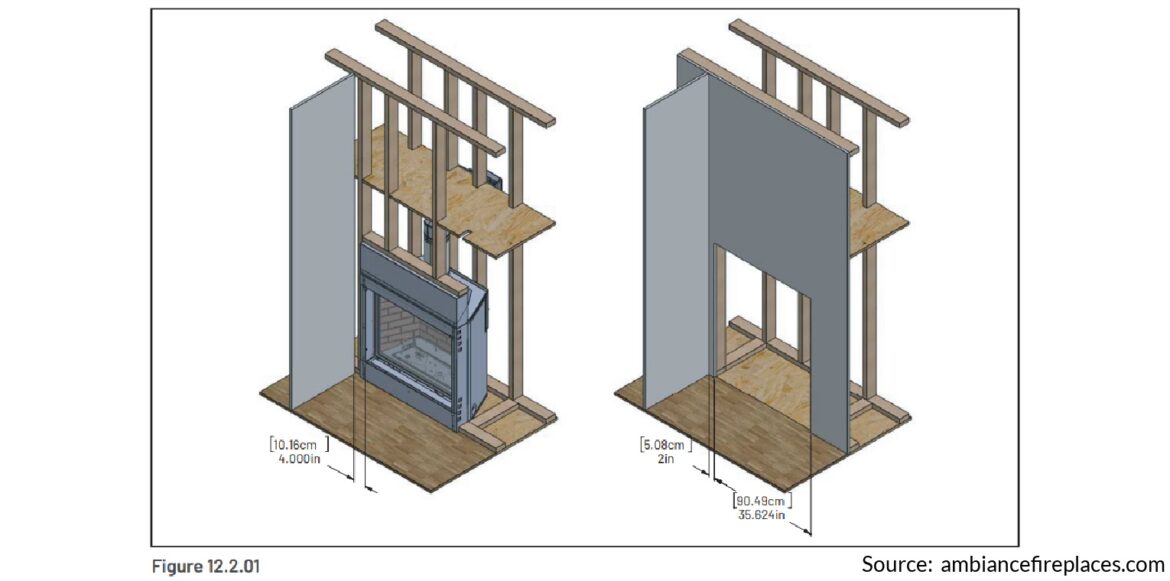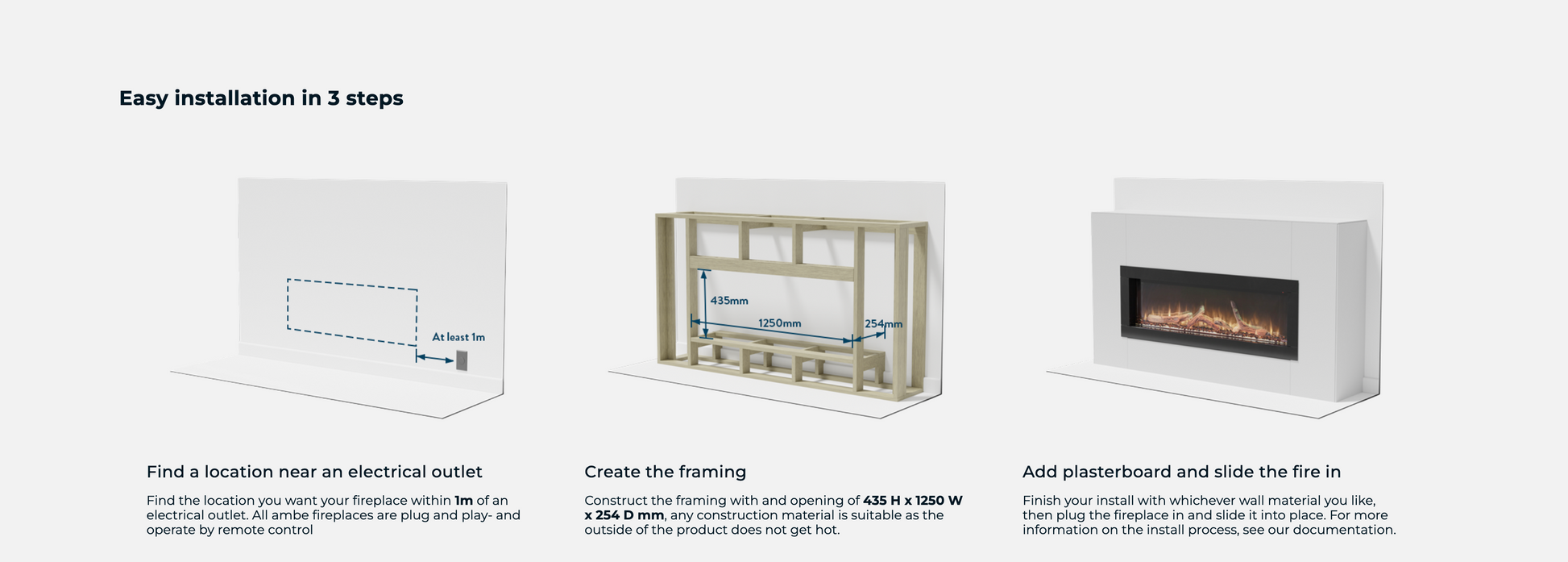Have you ever settled down in front of your gas fireplace, only to notice the wall behind it feels hotter than usual? You might wonder what’s happening and whether it’s something to worry about.
You’re not alone in this curiosity, and understanding the reasons behind it can save you from potential hazards or expensive repairs. This article is here to guide you through the possible causes of a hot wall when your gas fireplace is on, helping you ensure your home stays cozy and safe.
Let’s dive into the reasons your wall heats up and what you can do about it.
Causes Of Wall Heating
Many homeowners notice their walls heating up when the gas fireplace is on. Understanding the causes can help address the issue effectively. It involves several factors, including heat transfer mechanisms, fireplace design, and insulation issues. Let’s explore each aspect to ensure your home stays comfortable and safe.
Heat Transfer Mechanisms
Heat transfer is a primary reason for wall heating. Fireplaces emit radiant heat, which can increase wall temperature. Convection also plays a role, circulating warm air around the room. Both processes can lead to higher wall temperatures.
Gas Fireplace Design
The design of your gas fireplace impacts wall temperature. Some models are designed to emit more heat outward. This can cause walls nearby to become warm. Fireplaces with inadequate barriers may direct heat towards adjacent walls.
Insulation Issues
Poor insulation can contribute significantly to wall heating. Insufficient insulation allows heat to pass easily through walls. This results in warmer surfaces near the fireplace. Proper insulation can help manage the heat distribution.
Potential Safety Hazards
A hot wall when your gas fireplace is on may indicate potential safety hazards. This could be due to poor insulation or faulty installation. Ensuring proper ventilation and checking for heat damage can prevent dangerous situations. Regular maintenance and inspection are crucial for safety and efficiency.
When you notice your wall heating up when the gas fireplace is on, your immediate concern might be the coziness it offers. However, it’s crucial to consider the potential safety hazards that come with it. A warm wall isn’t just about comfort—it’s a signal to pay attention to possible risks that could affect your home and health. The heat can lead to fire risks, structural damage, and health implications. Let’s dive into each of these aspects to understand how you can protect your home and loved ones.Fire Risks
A wall getting hot could indicate that your fireplace is operating inefficiently or improperly. This can lead to increased fire risks. If the heat is too intense, it might ignite nearby materials, like wooden paneling or curtains. Consider if you’ve ever left paper or flammable items near the fireplace. The proximity could be dangerous. Regularly check your fireplace’s installation and maintenance to mitigate these risks.Structural Damage
Excessive heat can weaken the integrity of your wall. This can lead to cracks or warping over time. Once I noticed a small crack forming near my fireplace, I knew it was time to assess how the heat was affecting the structure. Ask yourself: Have you seen any changes in the wall’s appearance or texture? If yes, inspect it further to prevent long-term damage. Addressing these issues early can save you from costly repairs.Health Implications
A hot wall could mean the fireplace is not venting properly. Poor ventilation can lead to harmful gases, like carbon monoxide, seeping into your living space. This is not just a property concern but a health risk for you and your family. Have you ever felt dizzy or had headaches while near the fireplace? These symptoms might be linked to inadequate ventilation. Ensure your fireplace is checked regularly to keep your home safe and your family healthy. Understanding these hazards ensures that you enjoy the warmth of your fireplace without compromising safety. Are you taking the necessary steps to protect your home?Preventive Measures
Feeling a hot wall when your gas fireplace is on can be concerning. It might indicate issues that need attention. Taking preventive measures can ensure safety and efficiency. Let’s explore how proper installation, regular maintenance, and improving insulation can help.
Proper Installation
Ensure your gas fireplace is installed by certified professionals. They follow safety codes and standards. A correct setup prevents overheating and reduces risks. Improper installation can lead to excessive heat on the walls.
Regular Maintenance
Schedule annual checks for your gas fireplace. Regular maintenance ensures all parts work properly. Technicians can spot potential problems early. This helps in preventing heat-related issues.
Improving Insulation
Insulating the area around your fireplace is crucial. It helps in heat distribution. Proper insulation prevents excessive heat from affecting the walls. Use materials that withstand high temperatures. This ensures safety and efficiency.

Credit: www.homecomfortwarehouse.com
Safety Tips For Gas Fireplaces
Gas fireplaces can cause walls to get hot due to heat transfer through conduction. Ensuring proper installation and using heat-resistant materials can help. Regular maintenance checks are essential to prevent overheating and ensure safety.
Gas fireplaces add warmth and ambiance to your home, but they also bring a few safety concerns. When your wall gets hot while the fireplace is on, it’s essential to ensure everything is functioning safely. These safety tips will help you enjoy your gas fireplace without worry.Monitoring Temperature
Keep an eye on the temperature of the wall near your fireplace. Use a thermometer to check if the heat is within a safe range. If it feels too hot to touch, it might be time to investigate further. Consider setting up a schedule to regularly check the wall temperature. Make it a habit just like checking your smoke alarm batteries. It only takes a moment, but it can prevent a potential hazard.Fireplace Accessories
Using a heat shield can protect your walls from excessive heat. These accessories are designed to deflect heat away, maintaining a safer environment. Invest in a quality fireplace screen or glass doors. They not only add a layer of safety by preventing sparks but also help manage the heat distribution in your room.Professional Inspection
Schedule regular inspections with a certified technician. They can identify issues that you might miss, ensuring your fireplace operates safely and efficiently. Don’t wait for a problem to arise. Regular maintenance can catch issues before they become serious. A professional can also offer specific advice tailored to your fireplace model. Have you ever wondered if your gas fireplace setup is truly safe? Taking these steps can make a big difference. Small actions today can prevent big problems tomorrow.When To Seek Professional Help
Feeling heat on your wall when the gas fireplace is on can be a warning sign. This might indicate improper installation or insulation issues. It’s wise to consult a professional to ensure safety and prevent potential damage.
When your gas fireplace warms your home, it should bring comfort, not concerns. However, if you notice that the wall behind your fireplace is getting unusually hot, it’s time to evaluate the situation carefully. Understanding when to seek professional help can save you from more significant issues down the line. Let’s dive into when you should call in the experts for assistance.Signs Of Serious Issues
A warm wall might initially seem harmless, but it can indicate deeper problems. If the wall feels excessively hot to the touch, it could suggest improper insulation or a malfunction in the fireplace unit. Listen for unusual noises, such as crackling or popping, that might hint at potential safety risks. Don’t ignore any discoloration on the wall surface. This can be a sign of overheating and potential damage to the structural integrity of your home. If you’re unsure, it’s better to be safe and investigate further.Consulting Experts
When you’re faced with these warning signs, contacting a professional is a wise move. An expert can assess whether your fireplace is operating safely and efficiently. They have the tools and knowledge to diagnose issues that might not be visible to the untrained eye. Think about the peace of mind you’ll gain from having a specialist inspect your system. Wouldn’t you prefer to address minor issues before they escalate into costly repairs? Consultations can often be scheduled quickly, providing you with timely advice and solutions.Repair And Replacement Options
Once a professional has assessed the situation, you’ll want to consider your options. If repairs are needed, they might involve improving the insulation around the fireplace or adjusting its components to prevent overheating. In some cases, replacement might be the best solution. Perhaps your fireplace model is outdated and less efficient than newer options. Consider the benefits of upgrading to a modern unit that offers enhanced safety features and better energy efficiency. This decision could save you money in the long run on energy bills and potential repairs. Remember, addressing these issues promptly is essential for your safety and peace of mind. Have you noticed any warning signs with your gas fireplace? If so, don’t hesitate to reach out for professional advice. Your home deserves the best care, and so do you.
Credit: yourstore.nz

Credit: diy.stackexchange.com
Frequently Asked Questions
Why Does My Wall Heat Up With A Gas Fireplace?
Gas fireplaces can radiate heat through walls. Poor insulation or proximity may amplify the warmth you feel.
Can A Hot Wall Indicate A Problem?
Yes, it might signal poor insulation or a potential hazard. Regular checks can prevent risks and ensure safety.
How Can I Reduce Wall Heat From My Fireplace?
Improving insulation or installing a heat shield can help. Consider consulting a professional for advice.
Is A Hot Wall Dangerous For My Home?
Potentially. Excessive heat can damage walls or pose fire risks. Ensure your fireplace setup is safe and well-ventilated.
Should I Worry If My Wall Feels Warm?
Not always, but consistent warmth warrants inspection. It’s wise to monitor changes and consult professionals if needed.
Conclusion
A hot wall near your gas fireplace can be concerning. It may signal improper insulation or ventilation issues. Regular maintenance checks can prevent heat buildup. Always prioritize safety and consult a professional. They can assess and resolve any fireplace concerns.
Ensuring proper insulation will help. It maintains a safe and comfortable home environment. Remember, early detection of issues saves time and money. Keep your home safe and cozy. Enjoy your fireplace without worry. Stay informed and proactive about your fireplace care.
Your peace of mind is worth it.





